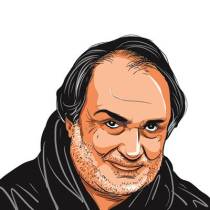Remembering Charanjit Singh
Charanjit Singh was killed by those fed on an ideology that demonises non-Muslims in Pakistan
Charanjit Singh represented his community as a member of Gurdwara Bhai Joga Singh, and was loyal to Pakistan. (Source: ANI)
On May 22, a prominent Sikh of Peshawar was shot dead in his shop. Charanjit Singh represented his community as a member of Gurdwara Bhai Joga Singh, and was loyal to Pakistan. He was not the first Sikh to be killed in Peshawar. A Sikh doctor, minister of minorities of Khyber-Pakhtunkhwa, was killed in 2016 by the Taliban — it had killed 10 Sikhs in 2013-14 as well.
The reaction to the killing of Charanjit Singh has been intense grief. But the tendency to blame someone else, and not the internal disorder, remains. Readers sending in their reactions to newspapers mostly blamed “external enemies” while knowing that the “internal” enemy, the Taliban, had killed Charanjit. The community was also harassed in Kurram (tribal) Agency where the Taliban was also decimating Shias. All minorities in Pakistan are at risk. In 2013, suicide bombers blew up the All Saints Church in Peshawar, killing nearly 100 worshipers.
Pakistan can’t prevent such killings because it has allowed sovereignty to flee most of its territory. Its ideology causes certain elements to break loose from the law because they disagree over the manner in which Pakistan enforces religious law. Al Qaeda didn’t take long to make it public that Pakistan was not really Islamic. Among several edicts it avoided enforcing was the abolition of modern banking. The Taliban think Pakistan is a pagan country because it avoids implementing the sharia.
The Taliban was born of the idea of keeping the tribal areas as a kind of “tribal museum” without proper administration, infrastructure and law. Soon the “wild” but pure warlike people living in the tribal areas were somehow fighting the first Indo-Pak war in Kashmir. Then, in 1970, the US and Saudi Arabia paid the tribesmen good money to fight the Soviet army in Afghanistan. In time, they started spilling into the settled areas and were soon counted the second largest ethnicity in Karachi.
All over Pakistan, madrasas indoctrinated the lower classes — who couldn’t afford to send their children to school — in hard Islam that challenged the Islamic state for not being Islamic enough. In 1947, there were only 137 madrasas in Pakistan. Nine years later, a survey reported that the number of madrasas had increased to 244 in West Pakistan. By 1995, the figure stood at 3,906, increasing to 7,000 in 2000 and 35,000 by 2016. Poor Pashtun households adopted the madrasa as their window to life.
Husain Haqqani, in Re-Imagining Pakistan, notes that at the Constituent Assembly of Pakistan some members actually called for “arrangements by the state to facilitate ‘the five times’ prayers and fasting’ and warned that ‘non-Muslims always take advantage of our goodness’”. Pakistan legislated to make an insult to the Prophet PBUH punishable with death to target Christians. But Muslims became victims of this law too.
The killers who took the life of Charanjit Singh in Peshawar were not persuaded by Pakistan’s “foreign enemies” to commit the evil deed. He was killed by Pakistanis nurtured on the ideology that subliminally refuses to accept non-Muslims in the “castle of Islam”. The Christian church in Pakistan, still conscientiously educating Muslims in their charity-run schools and colleges, has endured massacres of its impoverished flock who sweep the roads of Pakistan.
On 27 March 2016, 75 were killed and over 340 injured in a suicide bombing that hit the main entrance of Gulshan-e-Iqbal Park, one of Lahore’s largest parks. The attack targeted Christians who were celebrating Easter. Jamaat-ul-Ahrar, a Punjabi group affiliated with the Pakistani Taliban, claimed responsibility for the attack.
The writer is consulting editor, Newsweek Pakistan
For all the latest Opinion News, download Indian Express App
More From Khaled Ahmed
- Unhappiest In South AsiaThe unhappiness rankings need to take note: The lack of joy in Pakistan is palpable ..
- Reluctantly, MalalaMany in Pakistan reject her. Her own country remains impervious to her message...
- Pessimistic In PakistanPermanent self-flagellation has taken the shape of an abusive political discourse..







































No hay comentarios:
Publicar un comentario